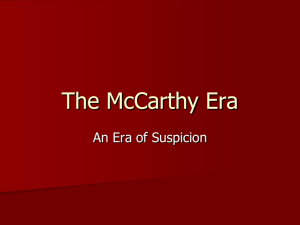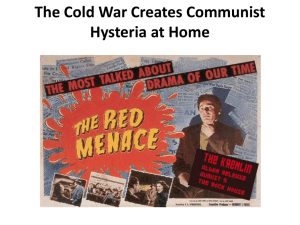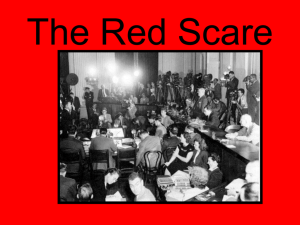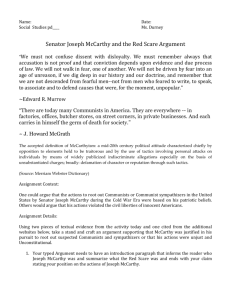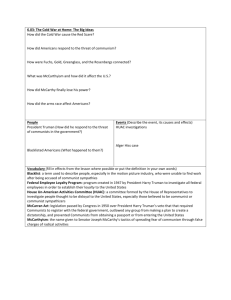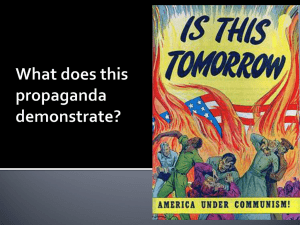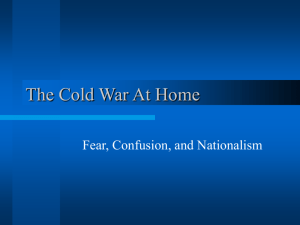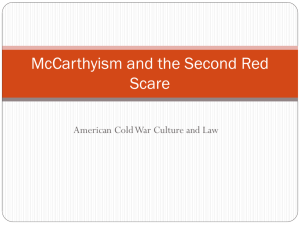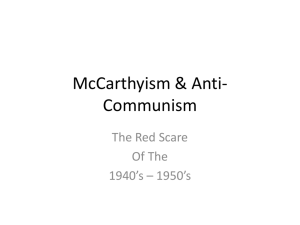Name
advertisement
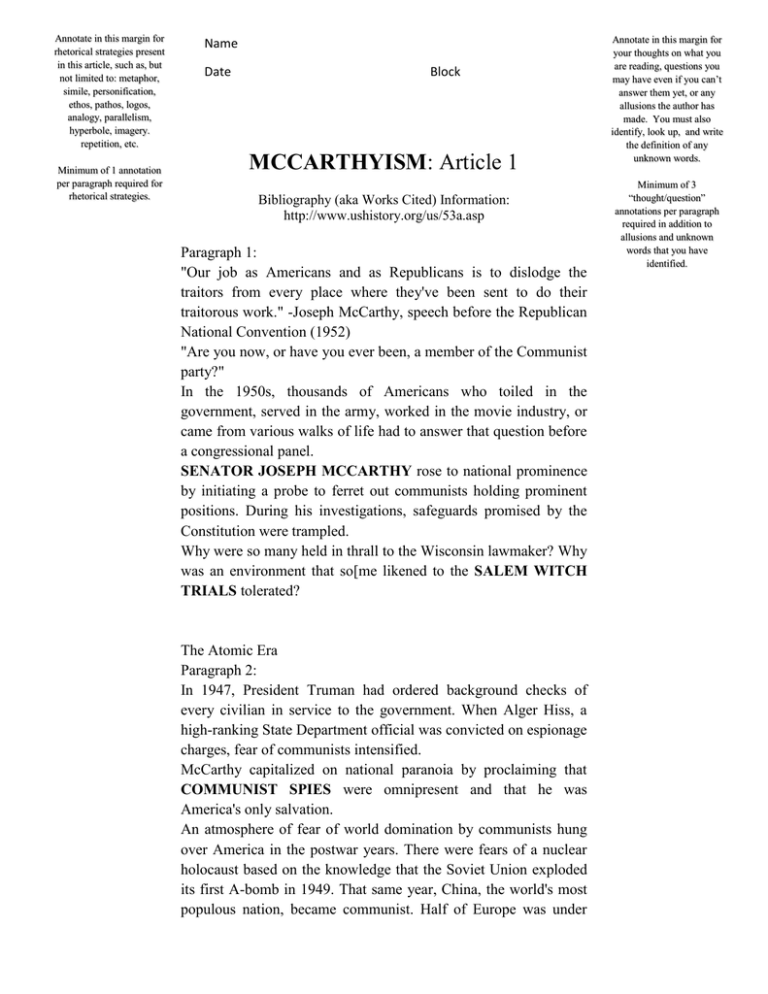
Annotate in this margin for rhetorical strategies present in this article, such as, but not limited to: metaphor, simile, personification, ethos, pathos, logos, analogy, parallelism, hyperbole, imagery. repetition, etc. Minimum of 1 annotation per paragraph required for rhetorical strategies. Name Date Block MCCARTHYISM: Article 1 Bibliography (aka Works Cited) Information: http://www.ushistory.org/us/53a.asp Paragraph 1: "Our job as Americans and as Republicans is to dislodge the traitors from every place where they've been sent to do their traitorous work." -Joseph McCarthy, speech before the Republican National Convention (1952) "Are you now, or have you ever been, a member of the Communist party?" In the 1950s, thousands of Americans who toiled in the government, served in the army, worked in the movie industry, or came from various walks of life had to answer that question before a congressional panel. SENATOR JOSEPH MCCARTHY rose to national prominence by initiating a probe to ferret out communists holding prominent positions. During his investigations, safeguards promised by the Constitution were trampled. Why were so many held in thrall to the Wisconsin lawmaker? Why was an environment that so[me likened to the SALEM WITCH TRIALS tolerated? The Atomic Era Paragraph 2: In 1947, President Truman had ordered background checks of every civilian in service to the government. When Alger Hiss, a high-ranking State Department official was convicted on espionage charges, fear of communists intensified. McCarthy capitalized on national paranoia by proclaiming that COMMUNIST SPIES were omnipresent and that he was America's only salvation. An atmosphere of fear of world domination by communists hung over America in the postwar years. There were fears of a nuclear holocaust based on the knowledge that the Soviet Union exploded its first A-bomb in 1949. That same year, China, the world's most populous nation, became communist. Half of Europe was under Annotate in this margin for your thoughts on what you are reading, questions you may have even if you can’t answer them yet, or any allusions the author has made. You must also identify, look up, and write the definition of any unknown words. Minimum of 3 “thought/question” annotations per paragraph required in addition to allusions and unknown words that you have identified. Joseph Stalin's influence, and every time Americans read their newspapers there seemed to be a new atomic threat. Paragraph 3: At a speech in WHEELING, WEST VIRGINIA, on February 9, 1950, McCarthy launched his first salvo. He proclaimed that he was aware of 205 card-carrying members of the Communist Party who worked for the United States Department of State. A few days later, he repeated the charges at a speech in Salt Lake City. McCarthy soon began to attract headlines, and the Senate asked him to make his case. On February 20, 1950, McCarthy addressed the Senate and made a list of dubious claims against suspected communists. He cited 81 cases that day. He skipped several numbers, and for some cases repeated the same flimsy information. He proved nothing, but the Senate called for a full investigation. McCarthy was in the national spotlight. Staying in the headlines was a full-time job. After accusing lowlevel officials, McCarthy went for the big guns, even questioning the loyalty of DEAN ACHESON and George Marshall. Some Republicans in the Senate were aghast and disavowed McCarthy. Others such as ROBERT TAFT and Richard Nixon, saw him as an asset. The public rewarded the witch-hunters by sending redbaiters (communist accusers) before the Senate and the House in 1950. Paragraph 4: "Tail Gunner Joe" Shot Down When Dwight Eisenhower became president, he had no love for McCarthy. Ike was reluctant to condemn McCarthy for fear of splitting the Republican Party. McCarthy's accusations went on into 1954, when the Wisconsin senator focused on the United States Army. For eight weeks, in televised hearings, McCarthy interrogated army officials, including many decorated war heroes. But this was his tragic mistake. Television illustrated the meanspiritedness of McCarthy's campaign. The army then went on the attack, questioning McCarthy's methods and credibility. In one memorable fusillade, the Council for the Army simply asked McCarthy, "At long last, have you no sense of decency left?" Poll after poll showed the American people thought McCarthy unscrupulous in his attack of the army. Fed up, McCarthy's colleagues censured him for dishonoring the Senate, and the hearings came to a close. Plagued with poor health and alcoholism, McCarthy himself died three years later. Blacklisting Paragraph 5: McCarthy was not the only individual to seek out potential communists. The HOUSE COMMITTEE ON UN-AMERICAN ACTIVITIES (HUAC) targeted the Hollywood film industry. Actors, writers, and producers alike were summoned to appear before the committee and provide names of colleagues who may have been members of the Communist Party. Those who repented and named names of suspected communists were allowed to return to business as usual. Those who refused to address the committee were cited for contempt. Uncooperative artists were blacklisted from jobs in the entertainment industry. Years passed until many had their reputations restored. Paragraph 6: Were there in fact communists in America? The answer is undoubtedly yes. But many of the accused had attended party rallies 15 or more years before the hearings — it had been fashionable to do so in the 1930s. Although the Soviet spy ring did penetrate the highest levels of the American government, the vast majority of the accused were innocent victims. All across America, state legislatures and school boards mimicked McCarthy and HUAC. Thousands of people lost their jobs and had their reputations tarnished. Other Witch-Hunt Victims Unions were special target of communist hunters. Sensing an unfavorable environment, the AFL (AMERICAN FEDERATION OF LABOR) and the CIO (CONGRESS OF INDUSTRIAL ORGANIZATIONS) merged in 1955 to close ranks. Books were pulled from library shelves, including Robin Hood, which was deemed communist-like for suggesting stealing from the rich to give to the poor. No politician could consider opening trade with China or withdrawing from Southeast Asia without being branded a communist. Although McCarthyism was dead by the mid-1950s, its effects lasted for decades. Above all, several messages became crystal clear to the average American: Don't criticize the United States. Don't be different. Just conform.
